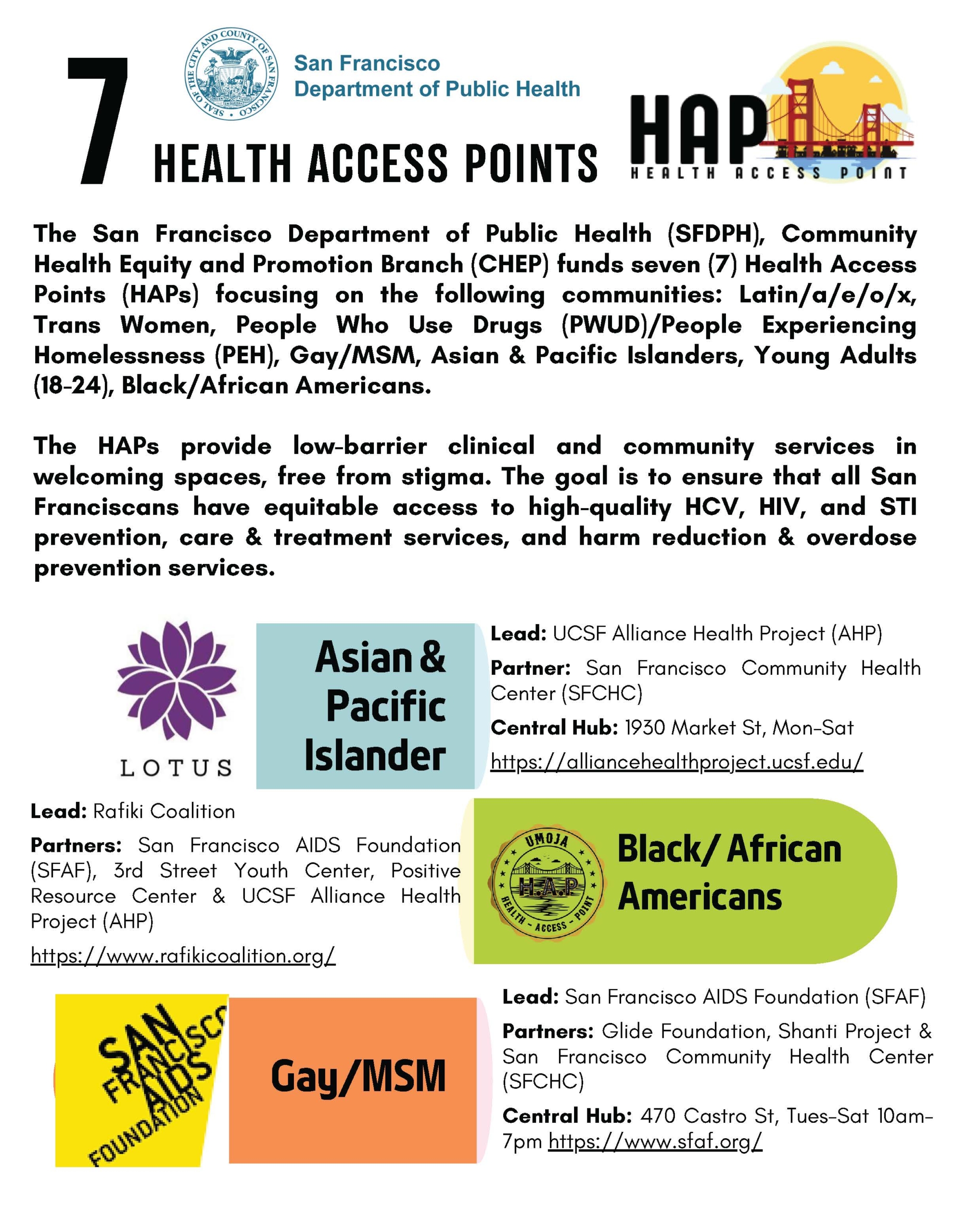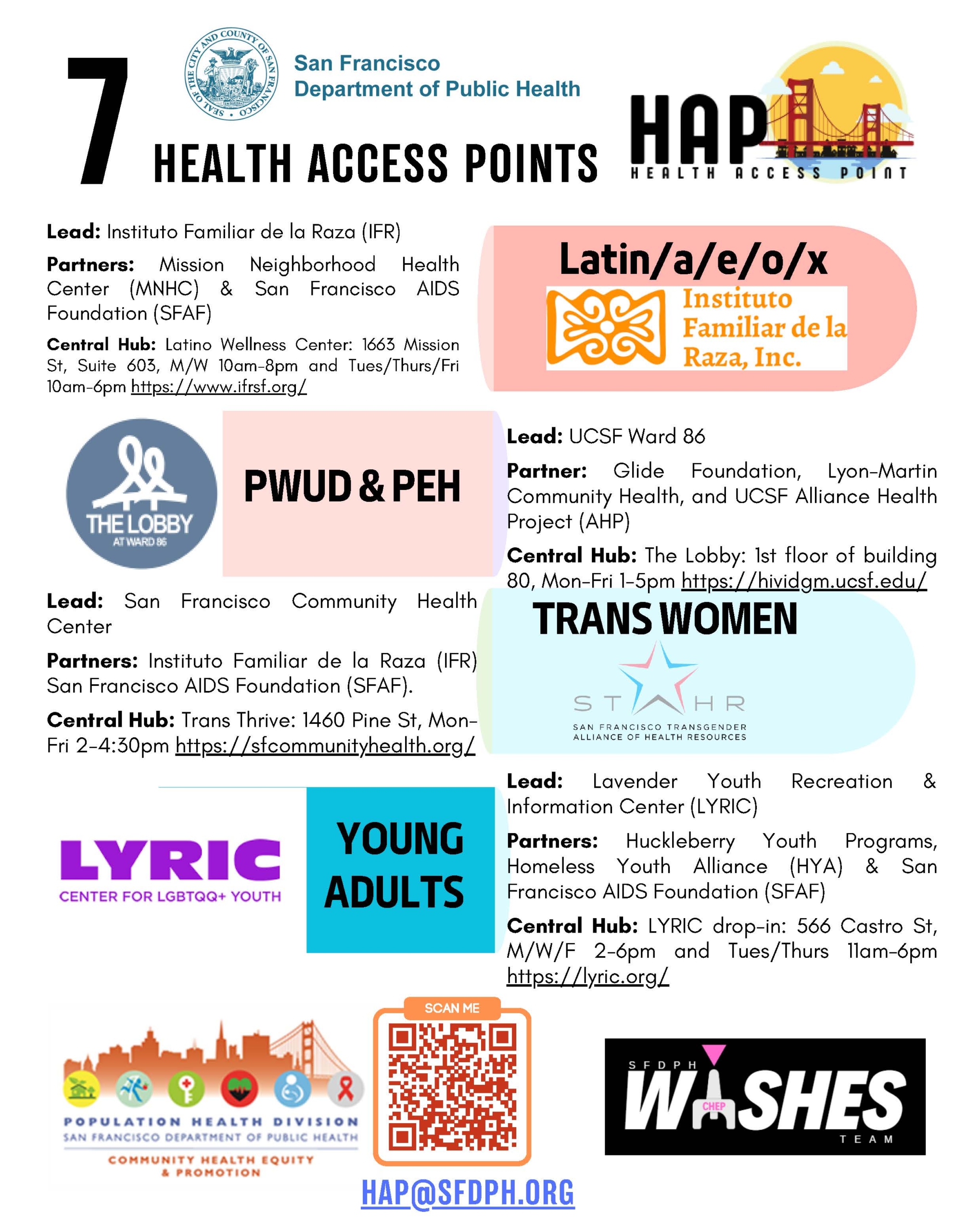


HAP Partners and Sites
The San Francisco Department of Public Health (SFDPH), Community Health Equity and Promotion Branch (CHEP) funds seven (7) Health Access Points (HAPs) focusing on the following communities: Latin/a/e/o/x, Trans Women, People Who Use Drugs (PWUD)/People Experiencing Homelessness (PEH), Gay/MSM, Asian & Pacific Islanders, Young Adults (18-24), Black/African Americans.
The HAPs provide low-barrier clinical and community services in welcoming spaces, free from stigma. The goal is to ensure that all San Franciscans have equitable access to high-quality HCV, HIV, and STI prevention, care & treatment services, and harm reduction & overdose prevention services.
Asian & Pacific Islander
Lead: UCSF Alliance Health Project (AHP)
Partner: San Francisco Community Health Center (SFCHC)
Central Hub: 1930 Market St, Mon-Sat
https://alliancehealthproject.ucsf.edu/
Black/African American
Lead: Rafiki Coalition
Partners: San Francisco AIDS Foundation (SFAF), 3rd Street Youth Center, Positive Resource Center & UCSF Alliance Health Project (AHP)
https://www.rafikicoalition.org/
Gay/MSM
Lead: San Francisco AIDS Foundation (SFAF)
Partners: Glide Foundation, Shanti Project & San Francisco Community Health Center (SFCHC)
Central Hub: 470 Castro St, Tues-Sat 10am- 7pm
https://www.sfaf.org/
Latin/a/o/e/x
Lead: Instituto Familiar de la Raza (IFR)
Partners: Mission Neighborhood Health Center (MNHC) & San Francisco AIDS Foundation (SFAF)
Central Hub: Latino Wellness Center: 1663 Mission St, Suite 603, M/W 10am-8pm and Tues/Thurs/Fri 10am-6pm
https://www.ifrsf.org/
PWUD & PEH
Lead: UCSF Ward 86
Partner: Glide Foundation, Lyon-Martin Community Health, and UCSF Alliance Health Project (AHP)
Central Hub: The Lobby: 1st floor of building 80, Mon-Fri 1-5pm
https://hividgm.ucsf.edu
Trans Women
Lead: San Francisco Community Health Center
Partners: Instituto Familiar de la Raza (IFR) San Francisco AIDS Foundation (SFAF).
Central Hub: Trans Thrive: 1460 Pine St, Mon- Fri 2-4:30pm
https://sfcommunityhealth.org/
Young Adults
Lead: Lavender Youth Recreation & Information Center (LYRIC)
Partners: Huckleberry Youth Programs, Homeless Youth Alliance (HYA) & San Francisco AIDS Foundation (SFAF)
Central Hub: LYRIC drop-in: 566 Castro St, M/W/F 2-6pm and Tues/Thurs 11am-6pm
https://lyric.org/
Contact: HAP@sfdph.org
Annual Training Requirements
SFDPH Harm Reduction Policy Resolution
Resolution:
No. 10-00
Adopting a Harm Reduction Policy For Substance Abuse, STD and HIV
WHEREAS, the San Francisco Department of Public Health seeks to reduce adverse health effects to individuals, to individuals’ families and to the broader community through legal and compassionate interventions; and,
WHEREAS, the Harm Reduction model of health care offers multiple non-judgmental approaches to assist clients in their movement toward better health; and,
WHEREAS, the Harm Reduction model is client-centered and attempts to reach clients “where they are at”, to assist them in making choices that lead toward better health; and,
WHEREAS, deaths in the City and County of San Francisco due to injection drug overdoses reached 180 in 1999, the third leading cause of lost years of life; and,
WHEREAS, existing research indicates that 90% of injection drug users who have injected for more than two years are infected with Hepatitis C, and 16% are infected with HIV; and,
WHEREAS, soft tissue infection associated with injection drug use is the leading diagnosis for admission at San Francisco General Hospital’s Emergency Department, leading to 1,400 inpatient admissions in 1999 (costing $18 million), 70% of which were uninsured; and,
WHEREAS, needle exchange, a Harm Reduction program, has proven to decrease further HIV and Hepatitis C infections by providing clients with clean needles with which to inject; and,
WHEREAS, practicing safer sex reduces the likelihood of transmission of sexually transmitted diseases (STD), including HIV; and,
WHEREAS, abstinence-based programs are successful for some individuals, but not all; and,
WHEREAS, recovery from substance use, practicing safer sex and improving health status often take place in an incremental manner; and,
WHEREAS, the serious consequences of substance abuse and unsafe sex cause significant health problems for the residents of San Francisco and some harm reduction practices have been shown to mitigate these health effects, now, therefore, be it
RESOLVED that all Department of Public Health providers, including DPH contractors, who deliver substance abuse, STD, and HIV treatment and prevention services, and/or who serve drug users and abusers in their programs shall: (1) address in their program design and objectives how they will provide harm reduction treatment options, and (2) develop harm reduction guidelines.
I hereby certify that the foregoing resolution was adopted by the Health Commission at its meeting of September 5, 2000.
Sandy Ouye Mori, Executive Secretary to the Health Commission
Harm Reduction Declaration of Compliance
Harm Reduction Policy (Updated for 24-25)
All agencies/programs funded by DPH shall:
- Address in their program design and objectives how they will provide harm reduction treatment options.
- Develop harm reduction guidelines. This is according to the Resolution of the Health Commission in September of 2000.
- Describe where the agency/program will post the following schedule and information to ensure that they are available and accessible to all clients:
- Up-to-date information about the location and schedule of syringe access and disposal services: please scroll down and click on ‘Pick up naloxone, fentanyl test strips, and more,” then scroll down and click on “Syringe Access & Disposal Schedule”
- Up-to-date referral information about naloxone access and the schedule of overdose prevention and naloxone distribution services: please scroll down and click on ‘Pick up naloxone, fentanyl test strips, and more”
- To get a free nasal naloxone kit and training and/or up to 10 fentanyl test strips, visit: Behavioral Health Services Pharmacy
1st floor at 1380 Howard St
San Francisco, CA 94103
M-F 9am-6:30pm
Sat-Sun 9am–12pm and 1pm-4:30pm
- Develop and implement an onsite overdose response policy that describes the steps the agency/program will take in the event that an individual overdoses on property managed by the agency/program or in the presence of agency/program staff.
- Ensure that all staff receive training in overdose prevention strategies. The “Opioid Overdose Recognition and Response 2024-2025″ training is an online course that can be taken on learnsfdph.
- Ensure that all staff participate in at least one annual harm reduction training, provided or sponsored by the Harm Reduction Training Institute (HRTI) (the trainings are either in-person, virtual, self-paced, or recorded) as documented in program records. Go to learnsfdph to view the training calendar.
- For FY24-25, staff can complete the following self-paced training: Healthcare for People Experiencing Homelessness: Barriers and Strategies That Work (2024-2025)
- People who complete this training will receive a certificate of completion. Continuing Education Units (CEUs) are not available.
For more information on San Francisco’s Harm Reduction Policy or the SFDPH Harm Reduction Training Institute trainings, please contact HRTI@sfdph.org.
SFDPH Overdose Prevention Policy
 Loading...
Loading...
SFDPH Policies and Operations Manual for HCV/HIV/STI Testing Services in Community-Based Settings
 Loading...
Loading...
CONTACT
Please contact us at HAP@sfdph.org.



